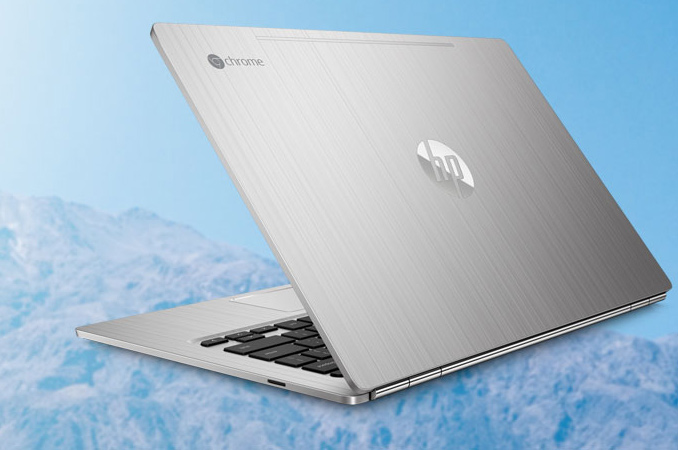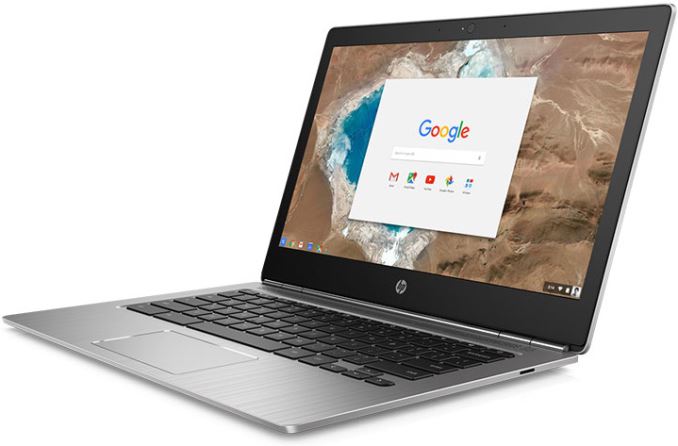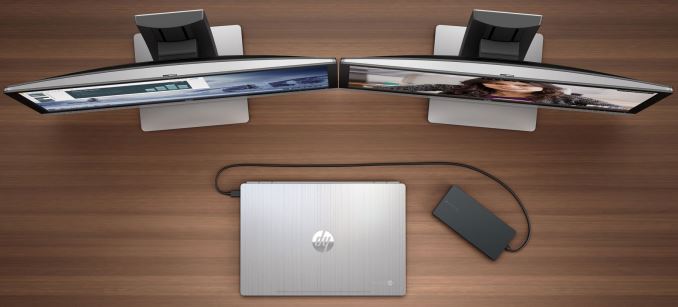HP Unveils Premium Chromebook: 3K Display, Intel Core M, 16 GB of RAM and USB-C
by Anton Shilov on May 3, 2016 8:00 AM EST
HP has announced a new family of Chromebooks, which are powered by Intel’s high-performance processors and feature stylish design, aluminum body, high-resolution display and even Bang & Olufsen speakers. The new laptops will not be as affordable as many other mobile PCs running Google Chrome OS and will not be as powerful as Google’s Pixel, however, this is what HP believes to be the right balance between performance, style, portability and price.
When Acer and Samsung introduced their first notebooks based on Google’s Chrome OS in mid-2011, they praised their low price and mainstream computing capabilities. At the time, Chrome OS was a mystery for most people, netbooks were relatively popular and it made sense for the aforementioned PC makers and Google to address the entry-level segment of the market with something very affordable. As Chrome OS gained traction, PC makers began to install higher-performing components into their Chromebooks. However, they were still not ready to address the high-end market segment with such PCs, which is why Google released its Pixel laptop in 2013. The Chromebook Pixel is one the most advanced and stylish Chromebooks ever made because of its Core i7 “Broadwell” CPU, a display with 2560×1700 resolution and 3:2 aspect ratio. But, the Pixel costs $999 and not all users are ready to invest that sum in a Chromebook. Fortunately, different PC makers offer various systems that attempt to replicate some of the Pixel’s features. HP decided to build its own competitor for Google’s Pixel and while the product is not exactly affordable, it has a better screen than most Chromebooks and a number of other advanced features.
The HP Chromebook 13 sports a 13.3” IPS display with 3200×1800 resolution (QHD+), 170-degree viewing angles and 16:9 aspect ratio, which is good for multimedia applications and video. HP’s latest Chromebook comes in brushed anodized aluminum chassis, it is 12.9 mm thick and weighs 1.29 kilograms (2.86 pounds), which is thinner and lighter than Apple’s MacBook Air 13”. Despite the very high resolution screen, the laptop works up to 11.5 hours on one charge of its 45 Wh battery, according to the manufacturer.
To enable long battery life, HP used Intel’s Skylake-Y system-on-chips to build its Chromebook 13. Various versions of the system are powered by either Pentium or Core M SoCs with two cores, Intel’s HD Graphics 515 (Gen9) core with 24 EUs (execution units) as well as 6W or 4.5W TDP. The system will likely be considerably faster than other Chromebooks running Atom, Celeron or Pentium processors because of the high-performance CPU architecture.
| HP Chromebook 13 Specifications | |||||
| Screen Resolution | 3200×1800 | ||||
| CPU | Intel Core m7-6Y75 | Intel Core m5-6Y57 | Intel Core m3-6Y30 | Intel Pentium 4405Y | |
| Graphics | Intel HD Graphics 515 (Gen9, 24 execution units) | ||||
| RAM | 16 GB | 8 GB | 4 GB | ||
| Storage | NAND flash storage | ||||
| Wi-Fi | 2x2 MIMO 802.11ac Wi-Fi module (?) | ||||
| Bluetooth | Bluetooth 4.2 (?) | ||||
| USB | 2×USB-C, 1×USB-A ports | ||||
| Other I/O | Microphone, stereo speakers, audio jack | ||||
| Thickness | 12.9 mm/0.5 inch | ||||
| Weight | 1.29 kilograms / 2.86 pounds | ||||
| Price | $1029 | $819 | $599 | $499 | |
Depending on the model and price, the HP Chromebook 13 can be equipped with 4, 8 or 16 GB of RAM, an unknown amount of solid-state storage as well as wireless connectivity technologies (a 802.11ac Wi-Fi module with Bluetooth 4.2 is likely, but is not confirmed by HP). HP notes that its system has a full-sized backlit keyboard as well as Band & Olufsen-tuned speakers, which is something new for a Chromebook. The system also has a webcam, three microphones, a 3.5 mm audio port, a SD card reader, one USB Type-A port as well as two USB Type-C ports. The Chromebook 13 uses USB-C for charging and is therefore compatible with a variety of third-party chargers.
With its advanced Chromebook 13, HP offers its Elite USB-C Docking Station ($149), which plugs in to a USB-C port on the PC and enables to connect up two Full HD displays, Gigabit Ethernet as well as multiple USB Type-A devices, such as keyboards or mice.
Four versions of the HP Chromebook 13 should hit the U.S. retail shortly. The most basic model running the Intel Pentium 4405Y processor and equipped with 4 GB of RAM will cost $499, whereas the top-of-the-range system featuring the Intel Core m7-6Y75 and 16 GB of RAM will cost $1029, which is even more than Google’s Pixel.
















145 Comments
View All Comments
jabber - Tuesday, May 3, 2016 - link
Yeah I was a huge Windows fan but now after using Chromebooks, Windows just feels way too over weight and slow. I also seem to spend far too much time seeing "Windows Updates are 100% Complete!" for far too long on my screen. Chromebook updates happen in a 6 second reboot. Chromebooks are the perfect on the go machines. I physically hate using my Windows 10 laptop now. It feels so leaden and that's with a decent CPU and SSD in it. Oh and I don't use Photoshop which seems to be the hold-outs excuse. And if most of them were honest, they don't really use it either. Like they only use 5% of Office.Michael Bay - Wednesday, May 4, 2016 - link
if you like using this garbage, typewriter is all you ever needed, or deserved in the first place.damianrobertjones - Wednesday, May 4, 2016 - link
Goes on holiday, takes pictures and video, returns and fills up his machine. It's simple things like this that make me laugh at people trying to justify these machines. Sure, of course, they do what they do but like an iPad mini it's limited and once you even remotely want to 'do' something sensible...gd22 - Thursday, May 5, 2016 - link
I usually take my pictures with my phone, not my laptop.nikon133 - Monday, May 9, 2016 - link
Perfect on-the-go machines... for what/whom?I'm a bit of photography fanatic and my perfect on-the-go machine is light, portable, with good screen, decent battery life... and Adobe Lightroom, plus enough storage to copy RAWs from my cameras.
So currently, my perfect on-the-go machine is Surface Pro 4. It also doubles as tablet/reader, one gadget less to carry when traveling.
My wife works on University and requires MS Office, ChemDraw and couple of other apps she has on her laptop. She is bent between Surface and something like ZenBook, plus desktop (replacement) at home... unless she goes for one machine to replace all, say Elitebook 1040 G3.
My mother does not need anything more than tablet, really. I guess she could use Chromebook, though she does use her machine in tablet form, without keyboard, much more than with keyboard....and she uses her iPad as a camera, too... that would be a bit too complicated with laptop format.
Eventually, most of my friends and relatives I can think of do have requirements that Chromebook could not fulfill. even for light travel scenarios. I'm sure it can do well for a few/some, but in general? Don't think so.
mrochester - Tuesday, May 3, 2016 - link
It's a bit like why people would buy an iPhone over an Android phone.rahvin - Tuesday, May 3, 2016 - link
Install a Debian or Ubuntu chroot using crouton. You should easily be able to install containers via the chroot. https://github.com/dnschneid/croutongd22 - Thursday, May 5, 2016 - link
I did the crouton thing, but after a while decided ChromeOS was a better choice for me.damianrobertjones - Wednesday, May 4, 2016 - link
" I'm a complete convert after the past few years of use."Congrats. You've found something that fits your requirements while limiting yourself. I use an iPad mini 4 but, obviously, I could use that for most things if I 'really' wanted to do so but instead I also have a Surface Pro 4. I'm not limiting myself 'just because'.
annomander - Thursday, May 5, 2016 - link
Why be condescending for it. Windows is over bloated and tiresome and freezes a lot if the time